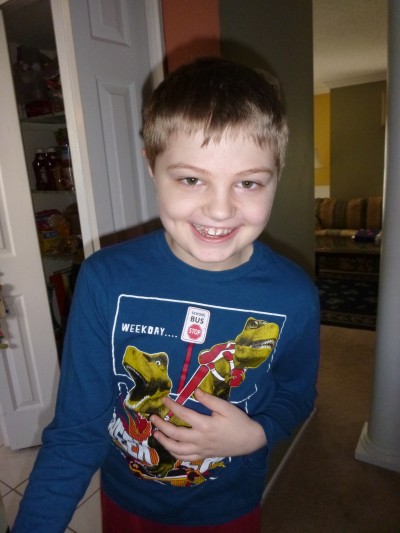
Editor’s note: In honor of Autism Awareness month I interviewed several parents of adult autistic children who are no longer in a traditional school setting. Although there is still much work to be done to support adult autistics in residential settings and in the workforce, there are families who have figured out how to create a safe and stimulating environment for their children. I am posting two of these interviews below. If you are seeking more information about how to transition your autistic child to adulthood I strongly recommend “Autism Adulthood: Strategies and Insights for a Fulfilling Life” by Susan Senator.
Interview #1:
1) How difficult was it for your child/children to transition from school to adult life? What was the process for you? Did your child’s/children’s school help you with the process?
|
|
Danny is currently still in school, but in a residential placement in KY. He was having issues and not meeting his potential and it was getting more difficult to keep him organized and productive without him getting agitated and/or aggressive.
2) How did you decide upon your child’s/children’s current placement, and please describe it. How did you find out about your different options?
We tried to look at what Danny’s lifelong needs were going to be and find a place that has will address his needs and allow him to be the best he can be. We wanted him to have as much independence as possible while still being in a structured environment and having a productive day.
3) What have been the most difficult parts of your child/children’s placement?
The most difficult part of his placement has been the distance. He is minimally verbal, so phone calls are not really an option for communication. We skype Monday through Friday while he is in his communication class, which has been wonderful, and I can see if he is not feeling well or is out of sorts.
The worrying about how he is doing when I am not in communication is the most difficult part. It can consume you. Letting him do things without us has been very difficult.
4) What have been the easiest parts, and what (if anything) surprised you?
In some ways, because of his disability, the easiest part has been that he is ok not being with us all the time. I was surprised (and somewhat hurt at first) by the fact that he was just as happy to let us go when the transition times come.
The friendships that he has made (and this is a young man who did not show any interest in doing things with others) are amazing. He is showing interest in just hanging with others and being part of a group playing basketball or going on the treadmill in the gym.
5) Do you have any tips for parents just beginning the process? What (if anything) would you have done differently?
Start looking at options as early as you can and think about trying some interim steps. For instance, allow your child to attend camp where they are away from you for overnight or longer.
I put many limitations on Danny out of fear and wanting to protect him, but he was capable of so much more.
You will have to continue to advocate for your adult child, but try to view them as independently as you possibly can.
Interview #2:
1) How difficult was it for your child/children to transition from school to adult life? What was the process for you? Did your child’s/children’s school help you with the process?
Personally our transition was a little challenging but once he got into a routine and was successful he did well. On or about the age of 17 you need to start thinking about what your child’s strengths are. Don’t rely on the school alone –as a parent you need to help identify areas where your child might be able to work and do well. Sometimes their strengths are different than what you think they are. The school should help in job sampling and guiding them.
2) How did you decide upon your child’s/children’s current placement, and please describe it. How did you find out about your different options?
Placement was decided for us – our selected placement was the only group willing to take Angelo at the time. A group home was the only option for us.
3) What have been the most difficult parts of your child/children’s placement?
Not having total control over decision-making and having to rely on others.
4) What have been the easiest parts, and what (if anything) surprised you?
Nothing was easy, but we were surprised at how happy he is and how much he has matured into a young man who enjoys his life and all that he does in it. His self-esteem has grown a great deal.
5) Do you have any tips for parents just beginning the process? What (if anything) would you have done differently?
Ask the school and other groups for help like the DCF (Department of Children and Families) and the DDD (the Division of Developmental Disabilities) for assistance. Always remember that you are the parent and all of these programs are only to assist you. Surround yourself with positive people who want to help you. As to doing things differently? My wife and I have always done thing the best we can, so there’s no regrets on our parts.
For more on my family visit my blog at autismmommytherapist.wordpress.com
Follow me on Facebook at Autism Mommy-Therapist

Advertisement

Police, Fire & Courts
Teacher From Brick, 36, Charged With Carrying on Affair With Student
Brick Life
Adult Autism Transition

Police, Fire & Courts
Teacher From Brick Charged in Another Sex Affair With Student








